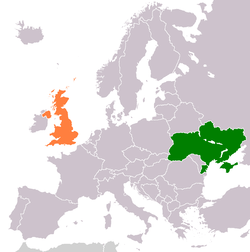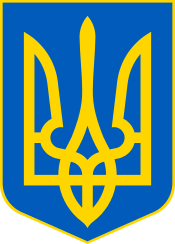Ukraine–United Kingdom relations
Ukraine–United Kingdom relations, or British–Ukrainian relations, are bilateral relations between Ukraine and the United Kingdom.
 | |
Ukraine |
United Kingdom |
|---|---|
The acting Ukrainian Ambassador to the United Kingdom is Andrii Kuzmenko,[1] and the British Ambassador to Ukraine is Melinda Simmons who was appointed in 2019.[2]
Country comparison
Great Britain and Northern Ireland | ||
|---|---|---|
| Population | 44,291,413 | 64,105,654 |
| Area | 603,500 km2 (233,013 sq mi) | 243,610 km2 (94,060 sq mi ) |
| Population Density | 73/km2 (191/sq mi) | 255.6/km2 (661.9/sq mi) |
| Capital | Kyiv | London |
| Largest City | Kyiv – 2,847,200 (3,275,000 Metro) | London – 8,174,100 (14,709,000 Metro) |
| Government | Unitary semi-presidential constitutional republic | Unitary parliamentary constitutional monarchy |
| Current leader | President Volodymyr Zelensky Prime Minister Denys Shmyhal |
Queen Elizabeth II Prime Minister Boris Johnson |
| Official language | Ukrainian (de facto and de jure) | English (de facto) |
| Main religions | 62.5% non-Religious, 33.6% Christianity, 0.6% Islam, 3.3% Other | 59.4% Christianity, 25.7% Non-Religious, 7.8% Unstated, 4.4% Islam, 1.3% Hinduism, 0.7% Sikhism, 0.4% Judaism, 0.4% Buddhism (2011 Census) |
| Ethnic groups | 77.8% Ukrainians, 17.3% Russians, 0.6% Belorussians, 0.5% Moldovans, 0.5% Crimean Tatars, 0.4% Bulgarians, 0.3% Hungarians, 0.3% Romanians, 0.3% Poles, 1.7% Others/Unspecified (2001 Census) |
87% White (81.9% White British), 7% Asian, 3% Black, 2% Mixed Race, 1% Others (2011 Census) |
| GDP (per capita) | $8,668 | $42,511 |
| GDP (nominal) | $130.7 billion | $3.056 trillion |
History
After World War II, work-permit schemes issued under the Attlee government (in office: 1945-1951) recruited Ukrainians to work in the mills of Lancashire and in the greenhouses of the Lea Valley (Middlesex/Essex). Large numbers of Ukrainians (mainly displaced persons from camps in Germany) arrived in the UK. Ukrainians were integrated into the UK as European Voluntary Workers, while Ukrainian POWs from the Polish and German armies were also demobilized and settled in the major cities of the UK.
Prime Minister Margaret Thatcher visited Ukraine in June 1990 when it was part of the Soviet Union.
Ukrainian Independence
The UK recognized the independence of Ukraine on 31 December 1991 (the first EU country to do so). After Ukrainian Independence from the Soviet Union in August 1991, diplomatic relations between Ukraine and the United Kingdom were established on 10 January 1992. Ukraine opened an Embassy in London in October 1992 and a Consulate General in Edinburgh in February 2002. The UK Consulate-General in Kyiv opened in November 1991 and became the Embassy in January 1992.[3]
Until 2005, the Presidents of Ukraine twice paid visits to the UK − in February 1993 and December 1995. The Prime Minister of the United Kingdom visited Ukraine in April 1996. The intensity of bilateral contacts at all levels boosted during 2008-2009. In particular, the President of Ukraine Victor Yuschenko visited the UK three times: in May, October 2008 and January 2009. As the result of the visit in May 2008, the Joint Statement that officially declared the strategic nature of Ukrainian-British relations was issued.[3]
Budapest Memorandum
Since the establishment of bilateral relations in Ukrainian-British communication, a dispute over nuclear weapons has emerged as the cornerstone. Britain, as one of the permanent members of the UN Security Council and a member of the nuclear club, was extremely sensitive to Ukraine inheriting from the USSR the third-largest nuclear arsenal in the world, far exceeding Britain's arsenal. Thus the UK was one of three main initiators for signing the Budapest Memorandum on Security Assurances and one of three main security guarantors of the countries that agreed to get rid of the nuclear arsenal, in particular, Ukraine. The document refers to three identical political agreements signed at the OSCE conference in Budapest, Hungary on 5 December 1994, providing security assurances by its signatories relating to the accession of Belarus, Kazakhstan and Ukraine to the Treaty on the Non-Proliferation of Nuclear Weapons. The memorandum was originally signed by three nuclear powers, the Russian Federation, the United Kingdom, and the United States of America. China and France gave somewhat weaker individual assurances in separate documents.[4]
Following the annexation of Crimea by the Russian Federation in 2014, the UK,[5] along with other countries,[6] stated that Russian involvement was a breach of its obligations to Ukraine under the Budapest Memorandum, a Memorandum transmitted to the United Nations under the signature of Sergei Lavrov, amongst others,[7] and in violation of Ukrainian sovereignty and territorial integrity.
2014 Ukrainian revolution and Pro-Russian unrest
.jpg)
Relations between the United Kingdom and Ukraine are currently very close,[8] there are regular bilateral visits between the countries and political dialogue covers the full range of international issues.[8]
Since the beginning of the Ukrainian revolution and Pro-Russian unrest in Ukraine, the United Kingdom has actively supported Ukraine and publicly condemned Russian actions. The UK supports Ukraine in becoming a member of the EU and NATO.[8][9] In this context London has implemented a series of sanctions and restrictive measures both in unilateral and multilateral formats.
Since the beginning of 2014 the following meetings have taken place: the meeting between Prime Minister of Ukraine Arseniy Yatseniuk and British Foreign Secretary William Hague during the FS visit to Ukraine (3 March), Prime Minister Arseniy Yatseniuk’s meeting with UK Prime Minister David Cameron on the sidelines of the EU Summit in Brussels (6 March); meeting between the President of Ukraine Petro Poroshenko with the UK Prime Minister David Cameron during the commemorations of 70th anniversary of the Normandy landings, as well as a number of meetings at the level of foreign ministers of the two countries (3 March, 7 May, 23 June).[3]
Military cooperation and NATO
The United Kingdom and Ukraine are both part of increased military cooperation and training programs as part of a long-term NATO exercise.[10] In June 2020, NATO formally recognised Ukraine as an Enhanced Opportunities Partner, a status given to countries that have made significant contributions to NATO-led operations and missions.[11][12] British Defence Secretary Ben Wallace welcomed the decision and praised current ongoing military training programs between both countries.[13]
Personalities
Boris Johnson
He is a British politician serving as Prime Minister of the United Kingdom and Leader of the Conservative Party since July 2019.[14][15]
His personality is important for Ukraine–United Kingdom relations as Boris Johnson is called the friend of Ukraine for his clear and indisputable position toward Ukraine-Russia relations even before being a Prime Minister.
Pavlo Polubotok
Pavlo Polubotok was a Cossack political and military leader and Acting Hetman of Left-bank Ukraine between 1722 and 1724. In Ukraine–United Kingdom relations he is mostly famous for his legend about the Gold of Polubotok. The story tells about a large amount of gold which Pavlo Polubotok supposedly deposited into an English bank in 1723 and which would have been returned upon the independence of Ukraine with an astronomical amount of interest. Even for today, a lot of Ukrainians know this story as an intriguing moment in Ukraine–United Kingdom relations.[16]
Cultural and economic relations
The United Kingdom is a major trade partner of Ukraine, it is the fifth-largest investor in Ukraine.[17]
The 2001 Census recorded 11,913 people born in Ukraine resident in the United Kingdom.[18] A large number of Ukrainians living in Britain are Ukrainian Catholics, under the jurisdiction of the Ukrainian Catholic Eparchy of the Holy Family of London, whilst many other Ukrainian Britons are Jews.
Twinnings
Embassies
The Embassy of Ukraine is located in London, United Kingdom. The Embassy of United Kingdom is located in Kiev, Ukraine.
See also
- Foreign relations of Ukraine
- Foreign relations of the United Kingdom
- Ukrainian diaspora in the United Kingdom
- Britons in Ukraine
References
- "Andrii Kuzmenko". Embassy of Ukraine to the United Kingdom. Retrieved 23 November 2014.
- "British Embassy Kiev". FCO.gov.uk. Retrieved 14 March 2015.
- "Political issues between Ukraine and Great Britain". Embassy of Ukraine to the United Kingdom. Retrieved 23 November 2014.
- Vasylenko, Volodymyr (15 December 2009). "On assurances without guarantees in a 'shelved document'". The Day. Retrieved 18 March 2014.
- Stevenson, Chris; Williams, Oscar (1 March 2014). "Ukraine crisis: David Cameron joins Angela Merkel in expressing anxiety and warns that 'the world is watching'". The Independent.
- Fisher, Matthew (24 March 2014). "Russia suspended from G8 over annexation of Crimea, Group of Seven nations says". National Post. Retrieved 27 February 2017.
- "Letter dated 94/12/07 from the Permanent Representative of the Russian Federation, Ukraine, the United Kingdom of Great Britain and Northern Ireland and the United States of America to the United Nations addressed to the Secretary-General" (PDF). United Nations. 19 December 1994. hdl:11176/44537. A/49/765; S/1994/1399. Archived from the original (PDF) on 19 October 2017. Retrieved 27 February 2017.
- Political relations
- Joint Statement by Prime Minister Gordon Brown and President Victor Yushchenko
- https://www.forces.net/news/operation-orbital-british-troops-training-ukraine-trench-warfare
- https://www.nato.int/cps/en/natohq/news_176327.htm
- https://www.kyivpost.com/ukraine-politics/nato-designates-ukraine-as-enhanced-opportunities-partner.html?cn-reloaded=1
- https://www.gov.uk/government/news/defence-secretary-welcomes-ukraine-receiving-nato-enhanced-opportunity-partner-status
- Lawless, Jill; Kirka, Danica (23 July 2019). "Boris Johnson chosen as new UK leader, now faces Brexit test". AP NEWS. Retrieved 23 July 2019.
- "Johnson 'absolutely' rules out early election". 2019-07-26. Retrieved 2019-07-26.
- Serhy Yekelchyk (25 May 2014). "Cossack Gold:History,Myth,and the Dream of Prosperity in the Age of Post-Soviet Transition". Canadian Slavonic Papers. 40 (3/4): 311–325. JSTOR 40869994.
- Country Profile: Ukraine
- "Country-of-birth database". Organisation for Economic Co-operation and Development. Retrieved 2008-12-03.

